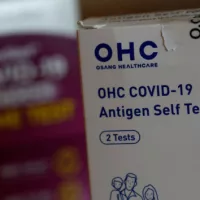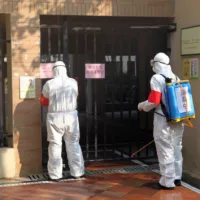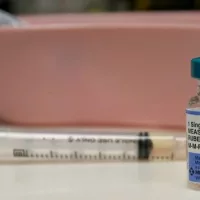
iStock(NEW YORK) — There is a lot of information floating around regarding the new coronavirus. While sharing personal advice is often well-meaning, it is important to focus on science to ensure that recommendations are based in fact.
Social media is spreading plenty of false rumors about COVID-19, especially when it comes to health and wellness suggestions.
Here are a few of the many tips being shared that are not supported by science and our responses to them.
Myth No. 1: Keep your mouth moist and drink a lot of water to prevent infection
There is no current scientific evidence behind the claim that keeping your mouth moist will prevent infection with coronavirus. But staying hydrated can help keep your immune system strong.
The temperature of the water you drink is not important, however, drinking water and staying hydrated is important for many reasons. According to the Centers for Disease Control and Prevention, water helps your body with a number of functions, including regulating body temperature.
Dr. Simone Wildes, an infectious disease specialist at South Shore Hospital in Boston agrees: “Hydration is always good; it helps with all bodily functions.”
People can usually meet their fluid needs by drinking water when they are feeling thirsty and drinking with meals. Your body requires more water when you are running a fever, are more physically active or have diarrhea or vomiting.
Tune into ABC News Live at noon ET every weekday for the latest news, context and analysis on the novel coronavirus, with resources from the full ABC News team.
Myth No. 2: Drink water often to flush virus into your stomach where acid will kill it
You cannot “flush out” the virus from your airway by drinking water. The idea that drinking water will push the virus into your stomach where it will be killed is not based on any scientific fact. But do stay hydrated.
Myth No. 3: If you have a runny nose, you probably just have the common cold
If you feel unwell for any reason, you should take precautions to avoid infecting others. The symptoms of coronavirus are not specific and can vary greatly.
The common cold and seasonal influenza are viral infections that can have very similar, even sometimes identical, symptoms to COVID-19, including fever, cough and shortness of breath. Coronavirus, influenza and a common cold can present with cough and shortness of breath. Both coronavirus and influenza can cause fever as well.
Overall, if you feel unwell, take precautions — something that feels mild to you can cause significant sickness in someone who is at high risk for infections. Wash your hands, avoid social gatherings and wipe down commonly touched surfaces (doorknobs, light switches, countertops, phones, etc.). Call your doctor or local urgent care for more personalized recommendations, or seek urgent care if your mild symptoms become more severe.
Wash your hands for a minimum of 20 seconds to remove germs and stay healthy.
Myth No. 4: Holding your breath without coughing means no infection
A myth going around social media claims if you take a deep breath, hold it for more than 10 seconds and do it without coughing or discomfort, there is no fibrosis, or infection, in the lungs.
This advice has many layers, none of which seem to be based on science. Let’s break it down.
To start, according to the American Lung Foundation, lung fibrosis is scarring of the lung and can occur due to infections, medications, genetics or certain diseases. Being unable to hold your breath for more than 10 seconds without coughing may occur when you have fibrosis, but a diagnosis is much more complicated than this.
Wildes echoed the sentiment, saying, “That is absolutely not the way that fibrosis is diagnosed. This is diagnosed by a pulmonary doctor. This is also not the way to diagnose an infection.”
Additionally, you don’t need to have lung fibrosis to have coronavirus. If you are having breathing issues, this could mean that you have an infection — with coronavirus or any pathogen — or that another health issue is taking place. You should seek urgent medical care if you are having any breathing issues. Research is still developing regarding the changes seen in the lungs at the tissue level after a coronavirus infection, although one study did show some changes suggestive of the development of fibrosis. But again, data is lacking and it is too early to declare whether changes in lung tissue caused by coronavirus would be irreversible.
Myth No. 5: Go get the flu vaccine, it will help with the coronavirus
The symptoms of the flu and coronavirus are similar so developing fever and cough from influenza could result in having to be tested and/or isolated due to COVID-19. But no, there is no current evidence that the flu shot will help with coronavirus.
“First of all, you should get the flu vaccination. However, the flu vaccine will not protect you from coronavirus. They are different viruses,” Wildes said.
COVID-19 is caused by the novel coronavirus, and the flu is caused by influenza A and influenza B strains. Precautions for both viruses are similar though: frequent hand washing with warm soap and water for at least 20 seconds, cleaning frequently touched surfaces, avoiding close contact (social distancing) and staying home if you are sick.
Myth No. 6: This will go away by summertime
The short answer is probably not, but it is too soon to say.
According to Dr. Marc Lipsitch at the Center for Communicable Disease Dynamics at the Harvard School of Public Health, while we do expect to see some slowing in the contagiousness of COVID-19 as weather warms and schools close in the Northern Hemisphere, this decline is not likely to be significant enough to slow transmission of the virus.
Myth No. 7: Vitamin C and other supplements can boost your immune system to combat coronavirus
There are many conflicting recommendations regarding supplements and vitamins for immune health, however, no evidence exists at this time that adding supplements to your diet will protect you from coronavirus or spur a speedy recovery. Additionally, most people are able to obtain all of their necessary vitamins and minerals through a healthy diet.
Unless you have a vitamin deficiency, it is believed that supplements aren’t really necessary. Focus on eating a diet full of various fruits and vegetables to meet your vitamin and mineral needs.
When giving or taking health advice, it is important to focus on the facts. It is easy to get wrapped up in the claims about this infection while the world works together to try to understand and manage it. It is important not to panic, but to prepare and educate yourself based on science and research.
Copyright © 2020, ABC Audio. All rights reserved.















